2017 Sri Lanka floods
The 2017 Sri Lanka floods resulted from a heavy southwest monsoon, beginning around 18 to 19 May 2017.[1] Flooding was worsened by the arrival of the precursor system to Cyclone Mora,[2] causing flooding and landslides throughout Sri Lanka during the final week of May 2017.[3] The floods affected 15 districts, killed at least 208 people and left a further 78 people missing. As of 3 June, 698,289 people were affected, while 11,056 houses were partially damaged and another 2,093 houses completely destroyed.[4] According to Al Jazeera, about 600,000 people have been displaced due to the floods.[5]
| Date | May 2017 |
|---|---|
| Location | 15 districts of Sri Lanka |
| Cause | Flood and Landslide |
| Deaths | 224 |
| Non-fatal injuries | 72 |
| Missing | 78 |
| Property damage | 2,093 houses fully and 11,056 houses partially destroyed |
The flooding severely affected Sri Lanka's Western Province, Sabaragamuwa Province, Southern Province and part of Central Province.[6] The worst-affected districts were Kalutara,[3] Matara and Ratnapura.[7] In Kalutara, flooding of the Kalu River also triggered several mudflows.[8] Agalawatte, a town within Kalutara District, reported 47 deaths and 62 people missing as of 29 May, with many areas made inaccessible by landslides.[6] The Ratnapura District had recorded 79 deaths by 30 May.[7]
Floods
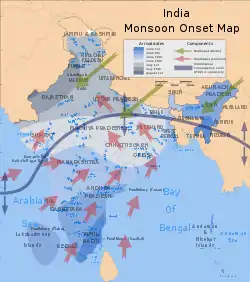
The southwest monsoon typically peaks during late May to the beginning of June in Sri Lanka, with prevailing winds from the south and southwest, streaming toward the Bay of Bengal. The areas that usually receive the heaviest rain are the south and west of the country, including Kalutara, Ratnapura, and Colombo. The monsoon was anticipated to arrive after 14 May, but owing to below-normal water levels in the region, it was initially not expected to cause severe flooding.[9]
Parts of Sri Lanka received 300 mm – 500 mm of heavy monsoon rain in a 24-hour period by 25 May, resulting in widespread flooding.[10] Highest recorded rainfall was 533 mm in Kukuleganga.[11] Galle, a coastal city, received 223 mm (8.8 in) and Ratnapura experienced 453 mm (17.8 in) of rainfall during the period of 27 to 30 May, leading to severe inland flooding.[7] On 27 May, an area of convective thunderstorms in the Bay of Bengal started to converge, moving to the northeast and becoming Cyclone Mora on 28 May. Cyclone Mora later affected Bangladesh and Myanmar.
By the evening of 25 May, the National Building Research Organisation (NBRO) of Sri Lanka had issued a "Level 3 Red Alert" landslide warning for the districts of Ratnapura, Kegalle, Galle, Kalutara, Matara, Hambantota and Nuwara Eliya.[12] Areas within Galle District became cut off due to landslides.[6] Part of the Southern Expressway closed, owing to flooding between Colombo and Matara.[13] The Kelani River, which runs through Sri Lanka's largest city Colombo, measured a water level increase of 15.44 m (50.7 ft) by 9:30 a.m. Sri Lanka Time (15:00 UTC) on 27 May,[10] and peaked by 28 May.[8] As of 29 May, the Bolgoda Dam in Panadura was at a risk of collapse.[14]
The death toll included at least 45 school children. By 1 June, around 95 people remained missing.[15]
Response
The Sri Lanka Armed Forces initially deployed nearly 10,000 personnel and equipment for relief, help and rescue operations.[6] This is the biggest deployment of troops during peacetime in Sri Lanka.[16]
The Sri Lanka Army deployed more than 1700 Army personnel of 17 Battalions, including Commando, Special Forces, Mechanized Infantry and Army medical personnel. BTRs, WMZs troop carriers and 30 Army boats and other machinery were deployed by the Army for the rescue operations. The Army also deployed sandbags for flood defenses.[17][18][19]
The Sri Lanka Navy deployed over 110 search-and-rescue teams comprising 776 naval personnel along with 116 relief boats.[20] The Navy began rescue work along the Kelani River by 19 May.[1]
The Sri Lanka Air Force deployed Mil Mi-17s, Bell 212s, and Bell 412 helicopters to rescue the affected in all areas. Flights involving B200 Beechcraft were deployed for continuous reconnaissance/observations over affected areas.[21]
During search and rescue operations a Sri Lanka Air Force Mil Mi-17E crashed over the Baddegama area, but no one aboard the chopper was injured.[22] One member of the response team died from injuries sustained while conducting rescue operations.[23]
At least 77,000 people were evacuated from the floods and relocated to safe locations. Sixteen hospitals in the flood-affected areas were also evacuated.[24]
International response
Foreign Minister told "16 countries had rushed relief supplies and medicine".[25]
.jpg.webp)
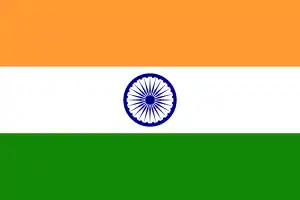 India – India sent its first ship INS Kirch with 40 tonnes of relief materials, a second relief ship INS Shardul with specialized rescue, diving and medical teams and relief material and the third ship INS Jalashwa with additional relief materials.[26]
India – India sent its first ship INS Kirch with 40 tonnes of relief materials, a second relief ship INS Shardul with specialized rescue, diving and medical teams and relief material and the third ship INS Jalashwa with additional relief materials.[26] China – China sent relief items worth US$2.2 million. Three People's Liberation Army Navy ships (Type 052C destroyer, Type 054A frigate and Type 903 replenishment ship) arrived at port in Colombo with relief materials and medical teams for victims.[27][28]
China – China sent relief items worth US$2.2 million. Three People's Liberation Army Navy ships (Type 052C destroyer, Type 054A frigate and Type 903 replenishment ship) arrived at port in Colombo with relief materials and medical teams for victims.[27][28] USA – The US Ambassador Atul Keshap expressed his condolences on behalf of the United States and pledged willingness to help in relief efforts.[29] US contributes approximately Rs. 350 million (US$2.3 million).[30] On June 11, USS Lake Erie (CG-70) arrived in Colombo to join with Sri Lanka Navy for post flood recovery operations.[31]
USA – The US Ambassador Atul Keshap expressed his condolences on behalf of the United States and pledged willingness to help in relief efforts.[29] US contributes approximately Rs. 350 million (US$2.3 million).[30] On June 11, USS Lake Erie (CG-70) arrived in Colombo to join with Sri Lanka Navy for post flood recovery operations.[31]
.jpg.webp)
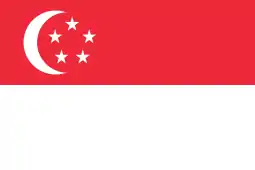 Singapore – The Singapore government donated US$100,000 through the Singapore Red Cross to support its relief efforts in Sri Lanka. Separately, Singapore Red Cross distributed US$50,000 worth of relief items to the affected communities.[32]
Singapore – The Singapore government donated US$100,000 through the Singapore Red Cross to support its relief efforts in Sri Lanka. Separately, Singapore Red Cross distributed US$50,000 worth of relief items to the affected communities.[32] UK – The UK High Commissioner James Dauris expressed his condolences and assured support.[29]
UK – The UK High Commissioner James Dauris expressed his condolences and assured support.[29]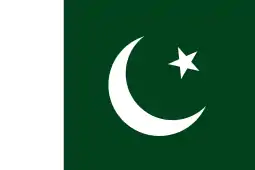 Pakistan – Pakistan has sent hospital and relief materials through two cargo flights, along with doctors.[33] Pakistan's naval ship PNS Zulfiquar arrived at Colombo with relief materials and a medical team to assist in relief operations.[34]
Pakistan – Pakistan has sent hospital and relief materials through two cargo flights, along with doctors.[33] Pakistan's naval ship PNS Zulfiquar arrived at Colombo with relief materials and a medical team to assist in relief operations.[34].svg.png.webp) Australia – Australia promised AUD $500,000 (Rs. 57 million) to meet urgent needs, including the deployment of high-grade inflatable boats and outboard motors for search and rescue missions.[27]
Australia – Australia promised AUD $500,000 (Rs. 57 million) to meet urgent needs, including the deployment of high-grade inflatable boats and outboard motors for search and rescue missions.[27] Israel – The Israeli ambassador to India and Sri Lanka, Daniel Carmon, delivered relief items.[35]
Israel – The Israeli ambassador to India and Sri Lanka, Daniel Carmon, delivered relief items.[35]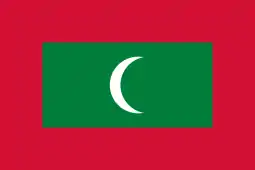 Maldives – The Maldivian government donated US$250,000 (38 million) and flood relief aids.[36]
Maldives – The Maldivian government donated US$250,000 (38 million) and flood relief aids.[36].svg.png.webp) Korea – The Korean government donated US$250,000 (38 million) and flood relief aids.[37]
Korea – The Korean government donated US$250,000 (38 million) and flood relief aids.[37]
References
- News, Hiru (19 May 2017). "Kelani River Overflows – Several Areas Flooded". Hiru News. Retrieved 2 June 2017.
- UNDP responding to Tropical Cyclone Mora in Sri Lanka, Bangladesh, Myanmar and India. May 31, 2017.
- "Sri Lanka floods: Scores die as monsoon triggers mudslides". BBC. 26 May 2017.
- "Special Situation for Bad Weather Condition" (PDF). Disaster Management Centre.
- "Sri Lanka floods leave 600,000 people displaced". www.aljazeera.com. Retrieved 2017-06-02.
- "Floods and landslides in Sri Lanka kill at least 150 people". theguardian.com. 29 May 2017.
- Prior, Ryan; Athas, Iqbal; McKirdy, Euan (May 30, 2017). "Sri Lanka floods: Battle to rescue stranded as death toll tops 180". CNN. Retrieved 2 June 2017.
- Peris, Roosindu (28 May 2017). "Kalutara flood situation deteriorates".
- Kotelawala, Himal (14 May 2017). "Monsoon On The Way – Is Sri Lanka Ready?". Roar Media. Retrieved 2 June 2017.
- "Sri Lanka: WHO Situation report – 1 Floods – May 2017 (27.05 2017)".
- "Rainfall as high as 553 mm recorded in the country". dailymirror.lk. 27 May 2017.
- "Landslide warning issued for 7 districts". dailymirror.lk. 29 May 2017.
- "Part of Southern Expressway, Sri Lanka's main E Class highway also temporarily closed due to flooding". colombopage.com. 29 May 2017.
- "Sri Lanka: Floods and Landslides – Office of the UN Resident Coordinator Flash Update (29 May 2017)". ReliefWeb. 2017-05-29. Retrieved 2017-06-02.
- AFP, via Yahoo News (1 June 2017). "Raft capsizes in flood-hit Sri Lanka, kills three". Agence France-Presse. Retrieved 2 June 2017.
- "Sri Lanka hails record military deployment as toll hits 213". AFP. 3 June 2017.
- "Rescue & Flood Relief Operations of the Army, Navy & Air Force are Underway". Army.lk. 29 May 2017.
- "Army Troops Prevent Nilwala River Bank Burst & Determinedly Continue Relief Roles". army.com. 30 May 2017.
- "(Update) Commander Supervises Army Rescue & Relief Operations in Worst-Hit Bulathsinhala Areas". Army.lk. 29 May 2017.
- "Developing Story; Navy steps-up flood relief operations in affected areas". navy.lk. 29 May 2017.
- "SLAF Assists Flood-Affected Countrymen". airforce.lk. 29 May 2017.
- "Sri Lanka Air Force helicopter carrying flood relief crashes". colombopage.com. 29 May 2017.
- "Airman died in rescue operations promoted". dailymirror.lk. 29 May 2017.
- Francis, Krishan (May 31, 2017). "Death toll in Sri Lanka mudslides, floods climbs past 200". The Associated Press. ABC News. Retrieved 2 June 2017.
- "Sri Lanka: Foreign aid arrives as flood toll tops 200".
- "Sri Lanka floods: International aid starts pouring in as island-nation hit by worst torrential rains in 14 years".
- "Three Chinese ships due with relief goods".
- "Three PLA Navy ships arrive in Colombo".
- "Countries join hands with Sri Lanka to help flood victims".
- "US contributes Rs. 350 million for Sri Lanka flood relief".
- "USS Lake Erie joins flood assistance efforts in SL".
- "Singapore Government to contribute US$100,000 in aid to flood-hit Sri Lanka". Channel NewsAsia. Retrieved 2017-06-09.
- "Pakistan sends Field Hospital, Relief goods for Sri Lankan flood victims".
- "Pakistan Naval Ship 'Zulfiquar' arrives at Port of Colombo with flood relief materials".
- "Israel rushes aid to Sri Lanka as floods displace thousands".
- "Maldives Financial assistance to Sri Lanka".
- "Korean Financial assistance to Sri Lanka".